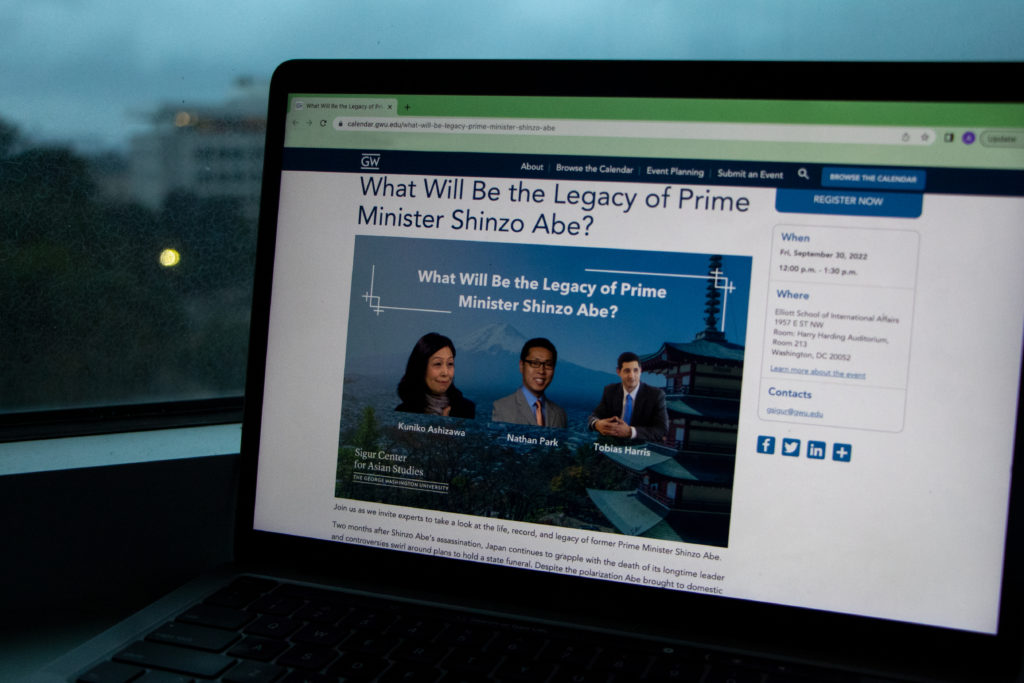A panel of experts discussed the legacy of Japan’s former Prime Minister Shinzo Abe at the Elliott School of International Affairs Friday.
Tobias Harris, Kuniko Ashizawa and S. Nathan Park spoke about Abe’s historical stances on issues like economics and international diplomacy after a suspect shot and killed Abe with a homemade gun, citing Abe’s ties to the controversial Unification Church as the reasoning for the assassination. The Sigur Center for Asian Studies hosted the event, which was held in the Harry Harding Auditorium.
Harris, a senior fellow at the Center for American Progress, said despite the outpouring of international condolences after his assassination last July, Abe had a mixed legacy within Japan. He said even holding a state funeral for the late Prime Minister came with contention because of his ties to the controversial Unification Church, a religious body that has muddled ties to some political figures in Japan like Abe.
“All you need to do is look at the response of the Japanese public,” Harris said. “This idea that you have a state-funded funeral ceremony for him this week. He was someone who, throughout his career, was divisive, controversial, someone who I think you could say, inspired passionate feelings on all sides.”
Harris said Abe was a role model for political ambition, rising through the ranks of the ruling Liberal Democratic Party, a conservative and nationalist party, and taking advantage of the shifting socio-political environment of post-Cold War Japan to come to power. He said his reforms to Japanese bureaucracy, economics, and the state itself were far-reaching, and he helped mold the LDP into a much more cohesive, confident and conservative political machine.
Ashizawa, the Japan coordinator for the Asian Studies Research Council and professor at American University, discussed the consequences of Abe’s signature economic policies on women and gender equality in Japanese society. Ashizawa said Abe appealed to vague conservative ideals like “family values” to lead backlash against feminist movements in Japan in the 1990s, which allowed him to rise through the ranks of the LDP.
“As Tobias already pointed out, Prime Minister Abe has been well known as a more conservative political leader to begin with,” Ashizawa said.
Park, an attorney at the law firm Kobre & Kim who writes on Asia’s economy, spoke about Abe’s relations with the Korean peninsula. He said Abe’s hardline policy against North Korea’s nuclear program and anti-communist posture closed the door on previous working relations with North Korea and adversely affected ethnic Koreans who lived in Japan.
“Before he was the prime minister, he focused very strongly on this issue to gain national prominence, which also had the effect of chilling the activities of the ethnic Koreans who are living in Japan being associated with North Korea,” Park said.
Park said relations with South Korea deteriorated sharply during Abe’s time in office, especially during his second premiership. He said relations deteriorated to the point of an outright trade war between the two democratic U.S. allies. He said these tensions are connected to Abe’s “historical revisionism” surrounding atrocities Imperial Japan committed before and during World War II against Koreans.
Park said although Abe was a strong American ally, it is important to not overlook his controversies simply because he was also opposed to the Chinese government.
“If we automatically assume that an enemy of our enemy is our friend, we, a lot of times, will come to a very rude surprise,” Park said.










